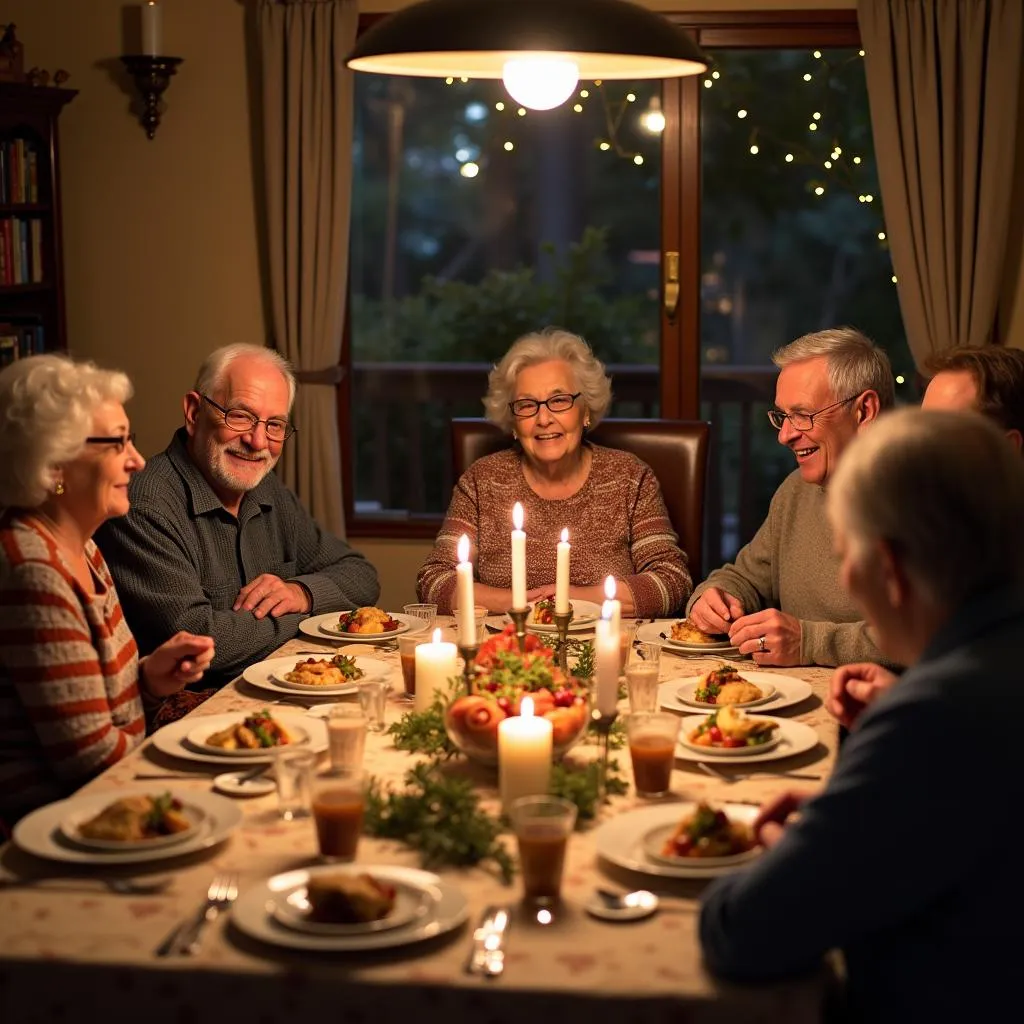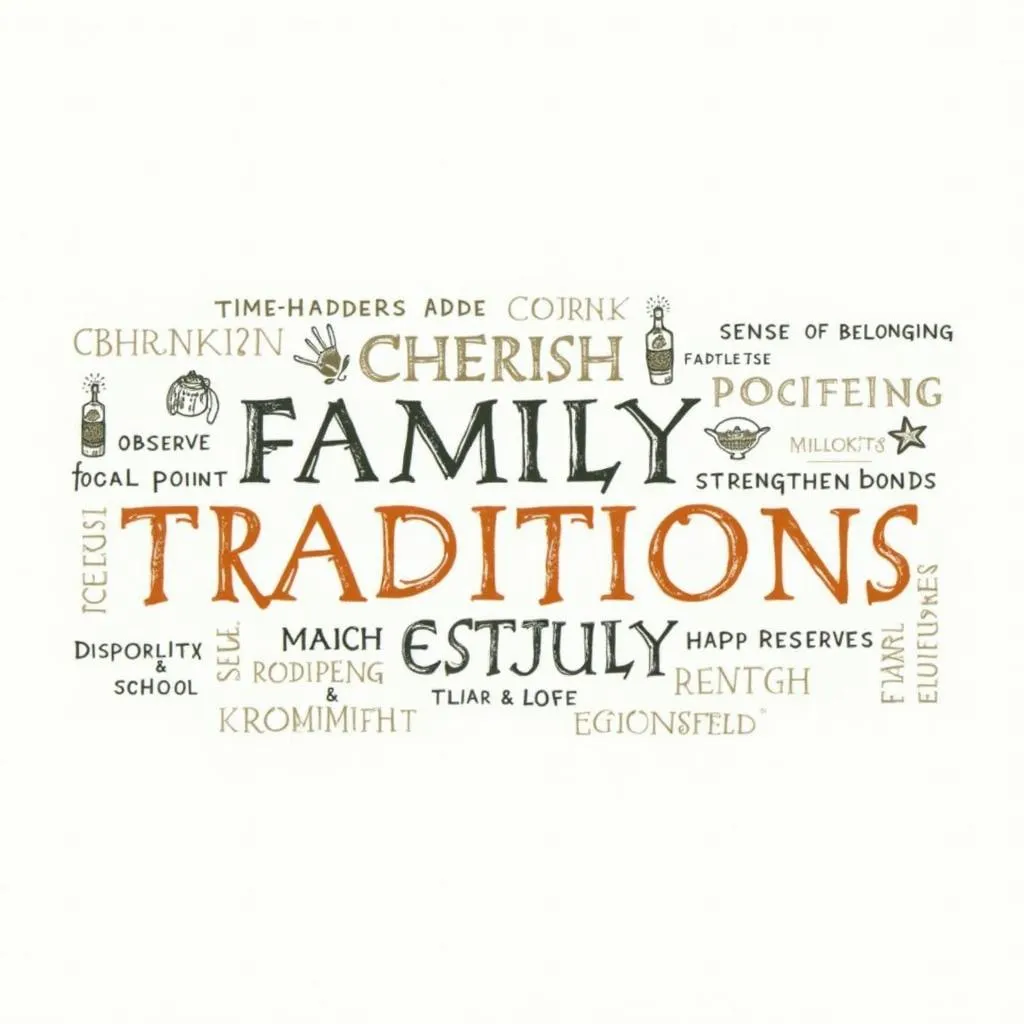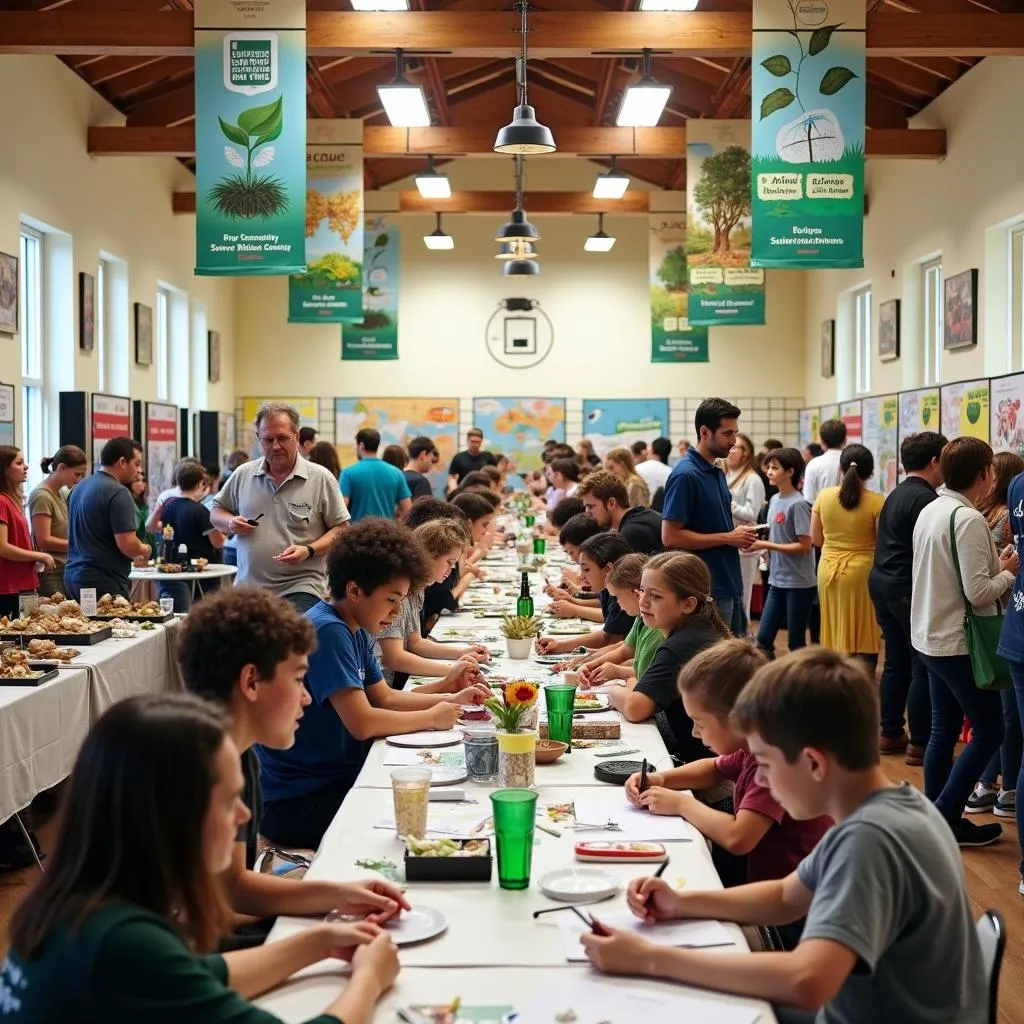Family traditions are a common topic in IELTS Speaking tests, particularly when candidates are asked to describe a significant custom or ritual within their household. This theme allows examiners to assess a candidate’s ability to articulate personal experiences, cultural insights, and emotional connections. Let’s explore how to excel in answering questions about family traditions in your IELTS Speaking exam.
Nội dung bài viết
- Part 1: Introduction and Interview
- Question: Do you have any special family traditions?
- Part 2: Long Turn (Cue Card)
- Follow-up questions:
- Part 3: Two-way Discussion
- Question: How do you think family traditions differ between urban and rural areas?
- Question: Do you think globalization is affecting family traditions? How?
- Key Vocabulary and Phrases for High Scores
- Examiner’s Advice
Part 1: Introduction and Interview
In this section, the examiner may ask general questions about family traditions. Here are some potential questions and a sample answer:
Question: Do you have any special family traditions?
Sample Answer (Band 7-8):
“Yes, we certainly do. One of our most cherished family traditions is our annual summer barbecue. It’s a highlight of the year for us, where extended family members from far and wide gather at our home. We spend the day cooking together, sharing stories, and enjoying each other’s company. It’s not just about the food, though that’s delicious; it’s more about strengthening family bonds and creating lasting memories.”
Describe a season you look forward to every year can be an excellent way to showcase your ability to discuss cyclical events, much like annual family traditions.
Part 2: Long Turn (Cue Card)
Here’s a potential cue card related to family traditions:
Describe a tradition in your family
You should say:
- What the tradition is
- When your family does this
- How long you have had this tradition
- And explain why this tradition is important to you
Sample Answer (Band 8-9):
“I’d like to talk about a cherished tradition in my family, which is our annual New Year’s Eve dinner. This time-honored custom involves gathering all family members, including extended relatives, for a lavish feast at my grandparents’ house.
Our family has been observing this tradition for over three generations, spanning more than 50 years. It typically begins in the late afternoon of December 31st, with everyone arriving and helping with the final preparations. The highlight is undoubtedly the elaborate meal, which always includes traditional dishes that have been passed down through the generations.
What makes this tradition particularly special and significant to me is the sense of continuity and connection it provides. It’s a tangible link to our family history and a way of honoring our ancestors. The dinner serves as a focal point for family reunions, allowing us to reconnect with relatives we might not see often during the year.
Moreover, it’s a time for reflection and anticipation. We often spend part of the evening sharing our achievements from the past year and our hopes for the coming one. This ritual of sharing helps to strengthen family bonds and create a sense of collective identity.
The tradition has also evolved over time, incorporating new elements as our family has grown and changed. For instance, we now include a special ceremony where the youngest family member lights a candle to symbolize hope for the future, while the eldest shares a piece of wisdom or advice.
In essence, this New Year’s Eve dinner tradition is far more than just a meal. It’s a celebration of family, continuity, and shared history. It provides a sense of belonging and stability in an ever-changing world, which is why it holds such a special place in my heart and in the hearts of all my family members.”
 Family gathered for New Year's Eve dinner tradition
Family gathered for New Year's Eve dinner tradition
Follow-up questions:
- How has this tradition changed over the years?
- Do you think it’s important to maintain family traditions? Why or why not?
Sample Answers (Band 8-9):
-
“Over the years, our New Year’s Eve dinner tradition has undergone subtle changes while maintaining its core essence. We’ve adapted to accommodate the growing family size by moving from a formal sit-down dinner to a more relaxed buffet-style setup. Additionally, we’ve incorporated technology to include family members who can’t physically attend, using video calls to connect with those living abroad. These changes have allowed the tradition to evolve while still preserving its fundamental purpose of bringing the family together.”
-
“I believe maintaining family traditions is crucial for several reasons. Firstly, traditions provide a sense of continuity and stability, especially in today’s fast-paced world. They serve as anchors to our roots and help reinforce family bonds. Secondly, traditions often encapsulate cultural values and heritage, passing them down through generations. This preservation of culture is invaluable in an increasingly globalized society. Lastly, family traditions create shared experiences and memories that contribute to a strong family identity. They offer regular opportunities for family members to reconnect and reaffirm their relationships, which is essential for maintaining close-knit family ties.”
Part 3: Two-way Discussion
In this section, the examiner might ask more abstract questions related to family traditions. Here are some potential questions and sample answers:
Question: How do you think family traditions differ between urban and rural areas?
Sample Answer (Band 7-8):
“I believe there are notable differences in family traditions between urban and rural areas, primarily due to lifestyle variations. In rural areas, traditions often revolve around agricultural cycles or local community events, fostering a stronger sense of community involvement. These traditions might include harvest festivals or seasonal celebrations that bring the entire village together.
In contrast, urban family traditions tend to be more diverse and individualized. With the fast-paced city life, urban families might create traditions that fit into their busier schedules, such as weekly family dinners or annual vacations. Urban traditions might also be influenced by global cultures, given the cosmopolitan nature of cities.
However, it’s important to note that these are generalizations, and there can be significant overlap and exceptions. Ultimately, the essence of family traditions – bringing people together and creating shared experiences – remains the same regardless of the setting.”
Describe a store where you often shop can be an interesting way to contrast urban and rural experiences, much like how family traditions might differ between these settings.
Question: Do you think globalization is affecting family traditions? How?
Sample Answer (Band 8-9):
“Globalization is undoubtedly having a profound impact on family traditions, both positively and negatively. On one hand, globalization has led to a cultural exchange that enriches and diversifies family traditions. Families are now exposed to and often adopt customs from other cultures, leading to unique hybrid traditions. For instance, it’s not uncommon to see families celebrating both Christmas and Diwali, regardless of their religious background.
However, globalization also poses challenges to maintaining traditional customs. The homogenization of culture driven by global media and consumerism can lead to the erosion of unique local traditions. Additionally, as family members move abroad for work or study, it becomes more difficult to gather for traditional celebrations, potentially weakening these customs over time.
That said, globalization has also provided new ways to preserve and share traditions. Technology allows families to maintain connections across distances, enabling them to participate in traditions virtually. Social media platforms have become spaces for sharing and celebrating cultural traditions, potentially reviving interest in customs that might otherwise have faded.
In essence, while globalization presents challenges to traditional family customs, it also offers opportunities for traditions to evolve, adapt, and even flourish in new ways. The key lies in finding a balance between embracing global influences and preserving the core values and significance of family traditions.”
Describe a person who has been a role model to you can be an excellent way to discuss how traditions and values are passed down through generations, linking to the topic of family traditions.
Key Vocabulary and Phrases for High Scores
To achieve a high score in your IELTS Speaking test when discussing family traditions, consider using these sophisticated vocabulary items and phrases:
-
Time-honored custom /taɪm ˈɒnəd ˈkʌstəm/ (noun phrase): A tradition that has existed for a long time and is respected.
Example: “Our New Year’s Eve dinner is a time-honored custom in our family.” -
To cherish /ˈtʃerɪʃ/ (verb): To hold dear; to keep or cultivate with care and affection.
Example: “We cherish our family traditions as they connect us to our roots.” -
To observe /əbˈzɜːv/ (verb): To follow or adhere to (a custom, rule, or law).
Example: “Our family has been observing this tradition for generations.” -
Focal point /ˈfəʊkəl pɔɪnt/ (noun phrase): The center of interest or activity.
Example: “The annual barbecue serves as a focal point for our family reunions.” -
To strengthen bonds /ˈstreŋθən bɒndz/ (verb phrase): To make relationships stronger.
Example: “These traditions help to strengthen bonds between family members.” -
Sense of belonging /sens əv bɪˈlɒŋɪŋ/ (noun phrase): A feeling of being connected and accepted within a group.
Example: “Our family traditions give us a strong sense of belonging.”
 Key vocabulary for describing family traditions
Key vocabulary for describing family traditions
Examiner’s Advice
To excel in the IELTS Speaking test when discussing family traditions:
-
Be specific: Provide detailed examples and anecdotes to illustrate your points.
-
Show reflection: Discuss not just what the tradition is, but why it’s important and how it affects you emotionally.
-
Use varied vocabulary: Incorporate a range of sophisticated words and phrases related to traditions and family.
-
Demonstrate cultural awareness: If appropriate, compare your family traditions to those of other cultures you’re familiar with.
-
Practice fluency: Work on speaking smoothly and confidently about your family traditions.
-
Be prepared to elaborate: Be ready to discuss related topics like the importance of family, cultural preservation, and the effects of modernization on traditions.
Remember, the key to a high score is not just in what you say, but how you say it. Aim for clarity, fluency, and depth in your responses.
Describe a foreign food you tried for the first time can be an interesting way to discuss cultural experiences, which can relate to family traditions, especially in multicultural contexts.
By following these guidelines and incorporating sophisticated language, you’ll be well-prepared to discuss family traditions in your IELTS Speaking test, demonstrating both your language skills and your ability to reflect on cultural and personal experiences.
Describe a time when you stayed in a hotel can be an interesting way to discuss how family traditions might be maintained or adapted when away from home, linking back to the main topic of family traditions.


